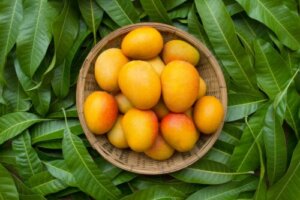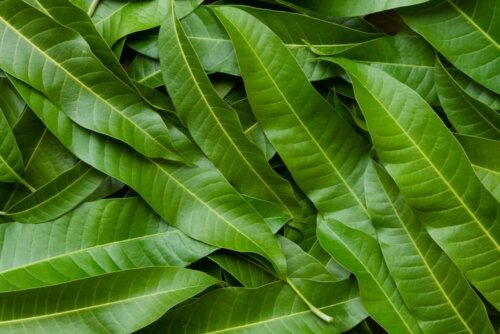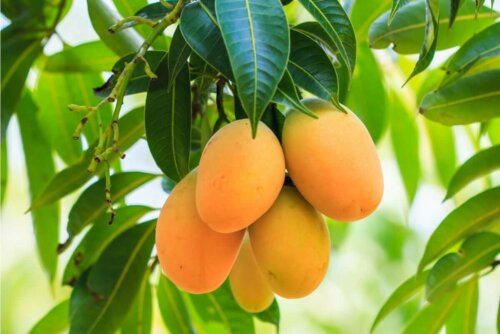Six Health Benefits of Mango Leaves

Many people are unaware that mango leaves are edible, even though the fruit of this tree is well known for its flavor, versatility, and nutrition value. In fact, these leaves have many concentrated medicinal compounds.
In particular, they’re attributed antioxidant, anti-inflammatory, antibacterial, and antitumor properties. Some people even use the extracts to make teas, supplements, and other complementary health care products. Continue reading to find out why you must include them in your diet.
The main benefits of mango leaves
There are about 69 species of Mangifera; however, the best-known one in terms of natural medicine is Mangifera indica. This is because its therapeutic applications come from Ayurvedic and indigenous medical systems.
While you can harness the stem, bark, roots, and fruit from the plant, some people believe its leaves have superior therapeutic effects. Let’s find out what health benefits are attributed to them.

1. The medicinal compounds of mango leaves
First of all, note that the benefits of mango leaves come from their concentration of medicinal compounds. To be more precise, they contain polyphenols and terpenoids, known for their ability to protect against the negative effects of free radicals.
These substances, in turn, have positive effects on visual health and the immune system. Therefore, regular consumption reduces the risk of eye diseases, infections, and other chronic diseases.
2. Anti-inflammatory activity
One of the most outstanding properties of mango leaves is its anti-inflammatory property. At least this is what a study published in BioFactors states. They claim that mangiferin contains a polyphenol that has the structure of C-glycosyl xanthone, which has the potential to inhibit excess inflammation.
In fact, there are other biological activities attributed to it, such as antioxidant, antidiabetic, analgesic, and immunomodulatory properties. In turn, some believe they can help reduce the risk of heart and neurological conditions.
Read about the Seven incredible reasons to eat mango
3. A coadjuvant for weight loss
Mango leaves aren’t a miracle weight loss product on their own. Still, incorporating them into a healthy and varied diet can help you attain optimal weight. Why? Well, some studies determined its components are coadjuvants in the metabolism of fats.
In particular, the extract of the mango leaves helps inhibit the accumulation of fat in the cells of the tissues. We need more evidence to confirm these effects but it’s a useful and safe supplement for most people — at least for now.
4. Mango leaves for treating diabetes
Diabetes is a complex disease that requires medical supervision and treatment. Therefore, you should only use remedies such as mango leaves as a supplement to treatment. This plant also has a favorable effect on the control of glucose levels in the blood due to its ability to improve fat metabolism.
In fact, research published in Plos One compared the effects of mango leaf extract and glibenclamide (a diabetes drug). Ultimately, they determined the extract group had slightly lower glucose levels than the glibenclamide group after two weeks.
5. Skin health
The benefits of mango leaves also extend to the skin. Its extracts are linked to a lower risk of premature aging due to its significant concentration of antioxidants. Even animal studies suggest that this ingredient helps protect against collagen breakdown and UV damage.
In addition, a publication in Colloids and Surfaces B: Biointerface states that the antibacterial properties of these leaves can fight the Staphylococcus aureus bacteria, responsible for various skin infections.

Learn about the Seven Surprising Benefits of Mangoes
6. Healthy hair
Oxidative stress has a lot to do with hair deterioration. In this respect, mango leaves and their antioxidant properties can help. While there’s little scientific evidence to link the extracts of these leaves with hair care, some believe they help prevent excessive loss and promote the healthy development of the strands.
Take advantage of the health benefits of mango leaves
Mango leaves are edible and you can also eat them fresh in a salad. However, the most common mode of consumption is brewing a tisane. To do this, boil about 12 mango leaves in two cups of water. Once it reaches its boiling point, let it steep until you’re ready to drink it.
Finally, you can find these leaves in some health food stores either as powder, extract or as a dietary supplement. You must dilute the powder in water, both for oral consumption and for external application. In general, mango leaves are safe for most healthy adults. However, always consult your doctor if you have any existing health conditions and for any other doubts that you might have.
All cited sources were thoroughly reviewed by our team to ensure their quality, reliability, currency, and validity. The bibliography of this article was considered reliable and of academic or scientific accuracy.
- Batool N, Ilyas N, Shabir S, Saeed M, Mazhar R. Mini-Review- A mini-review of therapeutic potential of Mangifera indica L. Pak J Pharm Sci. 2018;31(4):1441-1448.
- Zhang Y, Chen Q, Liu MY, et al. Effects of Benzophenones from Mango Leaves on Lipid Metabolism. Chem Pharm Bull (Tokyo). 2019;67(7):634-639. doi:10.1248/cpb.c18-00905
- Ediriweera MK, Tennekoon KH, Samarakoon SR. A Review on Ethnopharmacological Applications, Pharmacological Activities, and Bioactive Compounds of Mangifera indica (Mango). Evid Based Complement Alternat Med. 2017;2017:6949835. doi:10.1155/2017/6949835
-
Zhang Y, Liu X, Han L, Gao X, Liu E, Wang T. Regulation of lipid and glucose homeostasis by mango tree leaf extract is mediated by AMPK and PI3K/AKT signaling pathways. Food Chem. 2013;141(3):2896-2905. doi:10.1016/j.foodchem.2013.05.121
- Zhang Y, Han L, Ge D, et al. Isolation, structural elucidation, MS profiling, and evaluation of triglyceride accumulation inhibitory effects of benzophenone C-glucosides from leaves of Mangifera indica L. J Agric Food Chem. 2013;61(8):1884-1895. doi:10.1021/jf305256w
-
Ginsberg HN, Zhang YL, Hernandez-Ono A. Regulation of plasma triglycerides in insulin resistance and diabetes. Arch Med Res. 2005;36(3):232-240. doi:10.1016/j.arcmed.2005.01.005
-
Song JH, Bae EY, Choi G, et al. Protective effect of mango (Mangifera indica L.) against UVB-induced skin aging in hairless mice. Photodermatol Photoimmunol Photomed. 2013;29(2):84-89. doi:10.1111/phpp.12030
- Chirayath RB, A AV, Jayakumar R, Biswas R, Vijayachandran LS. Development of Mangifera indica leaf extract incorporated carbopol hydrogel and its antibacterial efficacy against Staphylococcus aureus. Colloids Surf B Biointerfaces. 2019;178:377-384. doi:10.1016/j.colsurfb.2019.03.034
This text is provided for informational purposes only and does not replace consultation with a professional. If in doubt, consult your specialist.








